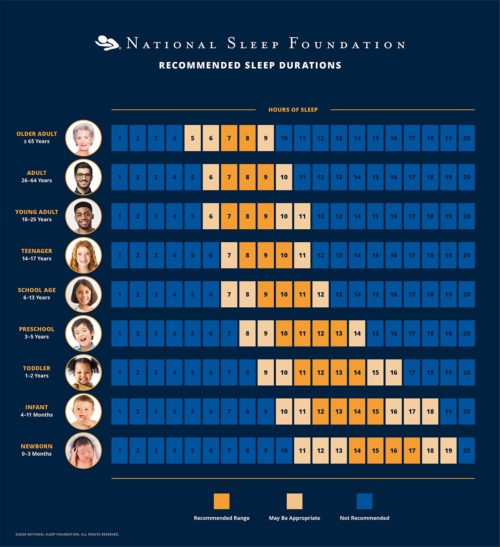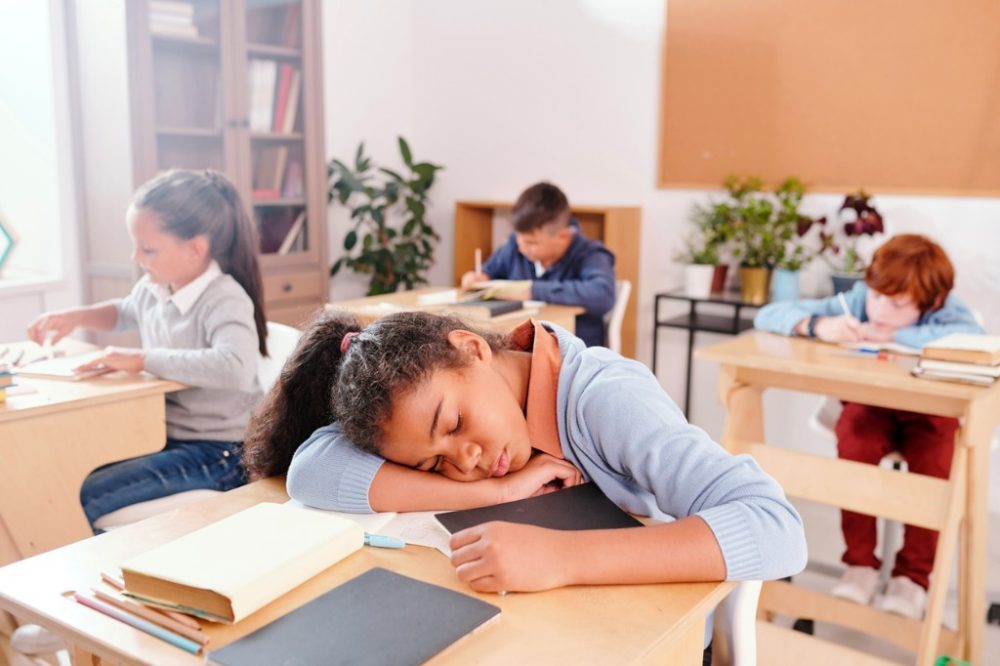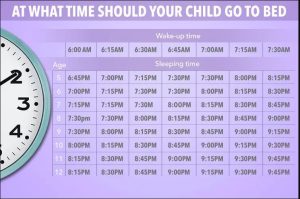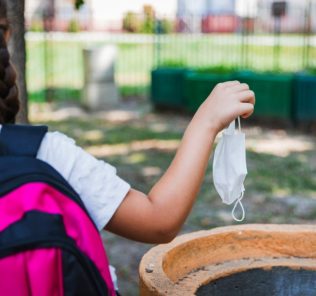Is your child’s bedtime too late? Teachers say sleep deprivation is harming UAE kids – and reveal the exact time children should go to bed based on their age
Do you ever struggle to get your child up for school in the morning? If your little one is cranky, sluggish or yawning at the breakfast table, they’re probably suffering from sleep deprivation that could be affecting both their health and their learning, warn UAE teachers.
After just a few of weeks back at school, some children are so exhausted that they’re dozing off on the bus journey into school, or even napping at their desks, say concerned UAE teachers, who are urging parents to stick to a more disciplined sleep routine.
There’s hard science to back up teachers’ worries, with studies showing that insufficient sleep can stunt children’s growth (almost all human growth hormone is introduced during slow-wave, deep sleep); make them more likely to bully or be bullied (lack of sleep impacts emotional regulation); and even heighten their risk of experiencing a neurodevelopmental condition such as ADHD.
Too little sleep can even cause long-term harm to a child’s cognitive function, making their brains literally smaller than well-rested peers. Longitudinal neuroscientific research from 2022 by the University of Maryland School of Medicine (UMSOM) shows that nine-and-10-year-olds who receive less than nine hours of sleep per night have physically less grey matter in the areas of the brain that are responsible for attention, memory and inhibition control – a negative impact that was worryingly observed to persist even after two years.
It’s a particular problem in the UAE, with most UAE school children admitting themselves that they aren’t getting enough sleep, according to the KHDA’s most recent Wellbeing Census of 189 Dubai Private Schools. In the survey of 108,224 Dubai students, pupils of all ages self-reported that they weren’t sleeping for long enough. Sleep deprivation was seen to increase as children got older – meaning that those studying for important public exams are particularly lacking in shuteye.
As children struggle this week to adapt back into the regular school bedtime routine after the Winter holidays, their lack of sleep can have an obvious impact on learning capabilities, says Carmella Jodrell, Head of Primary at The English College:
“Sleep-deprived children often have difficulty concentrating, leading to poor academic performance. Children have been known to fall asleep at their desks through sheer exhaustion. Fatigue can lead to decreased social interactions, hindering the development of social skills.
“Emotional stability and wellbeing hinges on good sleep hygiene. Sleep deprivation can contribute to irritability, mood swings and emotional instability, to name a few. It’s not just kids being kids, it’s often a lack of a decent night’s sleep.
“Ultimately, a long-term sleep debt can lead to behavioural challenges – children may exhibit increased impulsivity, hyperactivity and difficulty managing their behaviour, to name a few.”
Of course, the impact of sleep deprivation can vary with age, adds Mrs Jodrell:
“Younger children might become more irritable, while teenagers might experience mood swings and exhibit more risk-taking behaviours. When you’re tired, your ability to make good decisions decreases.
“Sleepiness leads to dulled reactions, so even at playtime or PE lessons, and other school sports activities, they don’t perform as well as they should.”
If your younger child is struggling with separation anxiety or morning tears, insufficient shuteye could be the cause of it, says Amy O’Rourke, Primary Teacher at Dubai International Academy Al Barsha (DIAB):
“Lack of sleep can really make a difference to how our little ones feel about school. When kids haven’t had their proper sleep, it’s like trying to solve a complex puzzle with missing pieces. It can be frustrating, and they might struggle to put everything together, whether it’s schoolwork, social interactions, or managing their emotions.
“However, when they prioritise sleep and get the rest they need, it’s like finding all the missing puzzle pieces. Suddenly, everything starts falling into place, and they become more attentive, confident, and emotionally resilient. It’s like magic, and it shows that a good night’s sleep is the best tool in their backpack for a successful school journey.”
Lizahn Jordaan, Secondary Maths Subject Leader at DIAB says that she’s even seen everything from poor grades to teenage withdrawal to supposed learning disorders be ‘cured’ by proper sleep hygiene:
“Lack of sleep will affect concentration and the ability to take in new concepts; if lack of sleep persists this will likely impact grades.
“When we’re tired, we feel a little grumpy and less inclined to socialize, which can lead to isolation.
“I have seen students who were diagnosed with supposed ‘learning disorders’ or who have had behavioural issues, improve simply by having better, regular sleep habits.”
There are countless medical studies backing this up, showing how a lack of quality sleep can be the root cause of behavioural issues, learning difficulties, mood disorders and even toileting issues.
The American Academy of Paediatrics links school students’ sleep deprivation with a worrying spectrum of adverse outcomes, including increased risk of anxiety, depression and suicidal ideation. It warns in its report that:
“Insufficient sleep represents one of the most common, important, and potentially remediable health risks in children.”
How much sleep should your child get each night?
So how much sleep should your child be getting?
It’s a lot more than most parents realise, says The English College’s Head of Primary, Carmella Jodrell:
“The average school-age teenager, for example, requires nine and a quarter hours’ sleep to be optimally alert. But research suggests that most average just 7.5 hours per night; while many more get just 6.5 hours of sleep per night on school nights, or less.
“So, as well as encouraging earlier nights, let them sleep in at the weekend!”
The chart below sets out exactly the time at which sleep scientists say your children should be going to bed every night:
Why don’t UAE children get enough sleep?
There are several factors at play that could contribute to UAE children not getting enough sleep, says Amy O’Rourke, Primary Teacher at Dubai International Academy Al Barsha (DIAB):
“The warm weather in the UAE is like an invitation to stay up late and enjoy cooler evenings with family! But this can make it a bit tricky for kids to catch much-needed sleep. Parents have to find the right bedtime routine that allows for both family time and a good night’s sleep.”
UAE parents may also be guilty of overscheduling their children, with Lizahn Jordaan, Secondary Maths Subject Leader at DIAB pointing out how hard UAE school children work and play:
“Students often have busy schedules. School days are packed full of exciting learning and are longer than other countries. Once home, students often have academic and sporting activities added after school; this is before they have time to socialise with friends.
“Academic expectations can be high, where students may feel the pressure to perform for themselves, parents, or sometimes school, leading them to spend hours working.
“Sticking to a sleep schedule and having one hours down-time before sleep is important.”
Cultural factors are also at play, adds The English College’s Carmella Jodrell:
“The UAE lifestyle and emphasis on achievement may lead to packed schedules, leaving less time for sufficient sleep.
“Screen time has a lot to answer for. Increased use of electronic devices before bedtime can disrupt sleep patterns due to the impact of blue light on melatonin production. Get your kids into the habit of leaving their devices – phones and handheld gaming machines, for example – out of their hands for the last hour or two of the day.
“There is also peer- and social pressure at play. Children might engage in social activities or online interactions late into the night, affecting their sleep schedules. Kids react well to schedules, and on weeknights, at least, try to ensure there’s nothing important going on late into the evening.”
The right amount of sleep for your child’s age
Delving deeper into the science, there is some flexibility when it comes to the exact time that your child goes to sleep, and different children will need different amounts of sleep, within certain boundaries.
The National Sleep Foundation states that sufficient sleep duration requirements vary across the lifespan and from child to child. It offers a set of recommendations that are appropriate for all healthy individuals who are not suffering from a sleep disorder.
The National Sleep Foundation Age-By-Age Sleep Chart
| Age | Recommended number of hours | May be appropriate number of hours | Not recommended number of hours |
| Newborns 0-3 mo |
14 to 17 | 11 to 13 18 to 19 |
Less than 11 More than 19 |
| Infants 4-11 mo |
12 to 15 | 10 to 11 16 to 18 |
Less than 10 More than 18 |
| Toddlers 1-2 y |
11 to 14 | 9 to 10 15 to 16 |
Less than 9 More than 16 |
| Preschoolers 3-5 y |
10 to 13 | 8 to 9 14 |
Less than 8 More than 14 |
| School-aged children 6-13 y |
9 to 11 | 7 to 8 12 |
Less than 7 More than 12 |
| Teenagers 14-17 y |
8 to 10 | 7 11 |
Less than 7 More than 11 |
| Young adults 18-25 y |
7 to 9 | 6 10 to 11 |
Less than 6 More than 11 |
How to help your child achieve good sleep
Carmella Jodrell, Head of Primary at The English College shares her advice:
- After encouraging tiring days of fun and physical activity, your kids should feel ready for bed! If the usual schedule is out of whack, introduce more (physical) activities earlier in the day so they become more tired than usual.
- Creating a calm, relaxing environment an hour or two before bedtime encourages relaxation and makes everyone — regardless of age – become more naturally aware it’s approaching bedtime. Storytelling and quiet games together are a great idea.
- Screens are a no-no, so try introducing a time after which the home becomes screen-free.
- A controlled sleep environment is another good idea, with plenty of advice around how to ensure the right temperature, create a nurturing, safe space and top tips like blackout curtains, white noise or noise-cancelling earplugs all good for those restless little ones.
- Diet is strongly linked with a good sleep routine – best not to let the kids finish the holiday candy right before bed, nor eat a huge restaurant meal and then get sent straight to bed!
- Parents need to inculcate regularity into their children’s evenings. A great way to encourage any teenager to get more sleep is to explain that there are numerous health benefits for teenagers who manage to get enough sleep, from better memory and retention of information – to the best encouragement to get any teenager to go to bed: it will help their appearance – delivering clearer skin and shinier hair, for example. Aside from helping biological changes, a good night’s sleep promotes good muscle growth and repair.
- Ultimately, parental modelling is a good way forward – let your kids watch and see what you do as it gets towards bedtime, and they will emulate your behaviour.

Do you think your child’s recommended bed-time is realistic? Or do you think UAE schools should all shift to a later start time to help students get more sleep? Please share your thoughts with [email protected].
© SchoolsCompared.com. A WhichMedia Group publication. 2023. All rights reserved.














































































Leave a Response